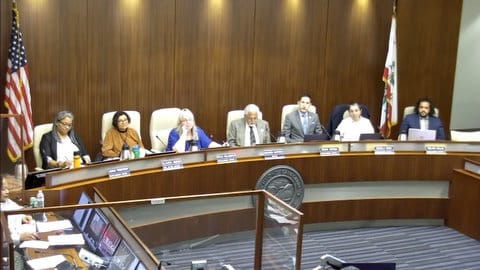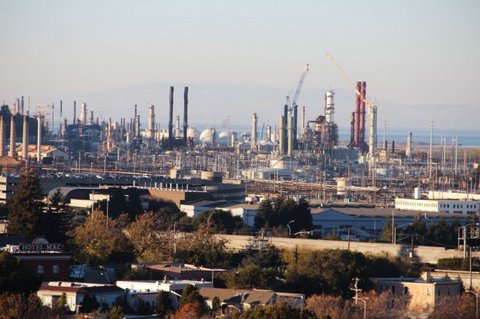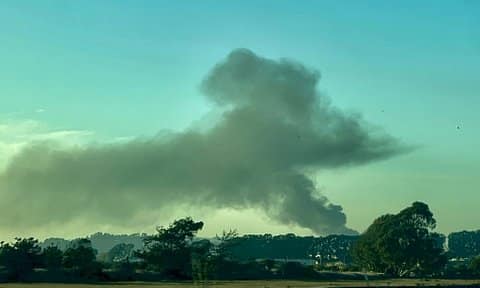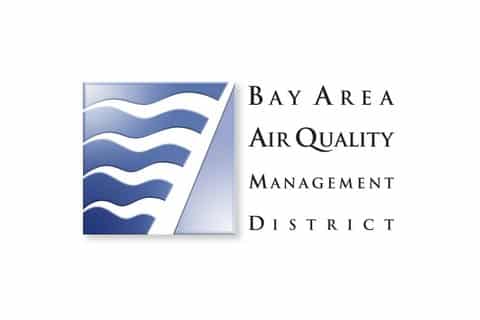
29 Feb Chevron Required to Reduce Emissions and Pay Up Millions

Holding Chevron accountable and working with PG&E to shift a low-income neighborhood from gas to electric were on the Richmond City Council agenda Tuesday. (Screenshot captured by Samantha Kennedy / CC Pulse)
By Samantha Kennedy
The Richmond City Council on Tuesday received a presentation from the Bay Area Air Quality Management District on the settlement that will require Chevron to reduce emissions and pay millions of dollars in fees. But the council and BAAQMD said this is only the first step in continuing to hold the company accountable.
“This day exemplifies that the days of Richmond being victimized by corporate greed and malfeasance are over,” said Mayor Eduardo Martinez. “We will stand up for the many and fight the powerful that don’t see our worth.”
The settlement requires Chevron to comply with Rule 6-5 by July 2026, which, according to BAAQMD’s presentation, has the “most stringent emissions limit in the country” for fluidized catalytic cracking units. Chevron must reduce airborne particulate matter from FCCUs, which make up around half of the refinery’s PM output, and pay $20 million to the Community Air Quality Fund.
BAAQMD said in a press release that compliance with Rule 6-5 by Chevron and the Martinez Refinery Company, which also settled with the district, would reduce health impacts and result in “tens of millions of dollars per year in health benefits.” Health impacts typically associated with exposure to PM include cancer, asthma and dementia.
>>>Read: “Chevron Is On Fire” Again. Change Is Long Overdue
District 1 Supervisor John Gioia, who represents communities in West Contra Costa and serves on BAAQMD’s board of directors, said the settlement also requires Chevron to pay an additional $20 million in fines for previous violations. A new policy proposed at BAAQMD, according to Gioia, would ensure that money collected from those fines would mostly go to the community it was collected from.
“I hope it gets adopted, which means more of this money could potentially benefit the Richmond, San Pablo, North Richmond area,” said Gioia.
The $20 million put in the Community Air Quality Fund by Chevron as part of the settlement also would give communities more ways to protect themselves in the future. How those funds will be spent will be up to the community.
Projects will aim to address PMs and their health impacts in West County communities. Executive Officer of BAAQMD Phillip Fine said the scope of potential projects is broad but must somehow relate to PMs. For example, Fine said projects could address PM exposure from cars or even restaurants.
Martinez suggested several actions that BAAQMD could do to further hold Chevron accountable. He recommended addressing the engineering, design, training and feed rates to combat flaring.
As part of the settlement, Chevron is required to take steps to reduce flaring before the July 2026 deadline. Proposed measures, some of which the company had already agreed to according to Fine, are automated flare monitoring, operator training and improved communication, such as putting flare events on its website and receiving community feedback.
City to consult With PG&E for Gas-to-Electric Pilot Program
City staff will begin talks with PG&E for a pilot program in a low-income neighborhood that would transition residents off gas by providing free electrical appliances.
“The electrification of the city is one of our main goals,” said Martinez, who co-sponsored the item with Vice Mayor Claudia Jimenez and council member Gayle McLaughlin. “It’s a direction the entire state needs to move in and I’m very happy all these forces — the housing, the energy — are banding together to make sure we have affordable housing as well as safe housing and energy sources for everyone.”
The Alliance of Californians for Community Empowerment said in its presentation to the council that children in households with gas stoves are “42% more likely to experience asthmatic symptoms.”
McLaughlin said another city, Albany, is already planning to stop using a block’s gas line by electrifying the entire block.
Neighborhoods that could potentially be a part of the pilot program, according to the staff report, are Iron Triangle, Belding Woods and Southside.
The next Richmond City Council meeting is on March 5.






No Comments